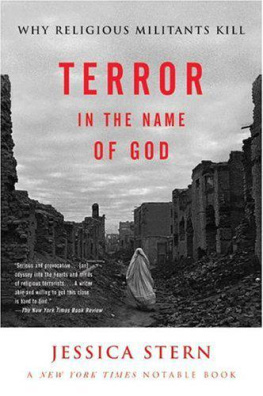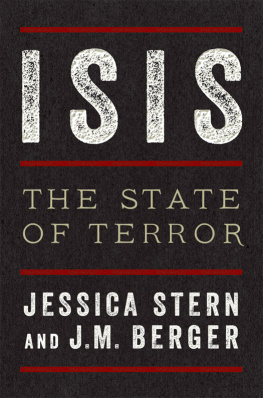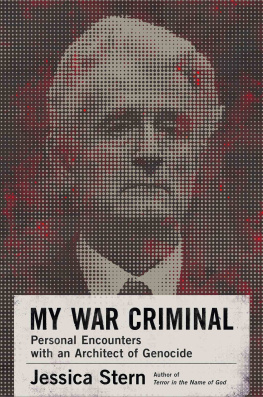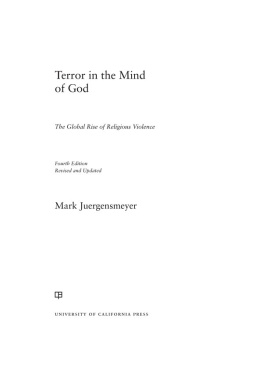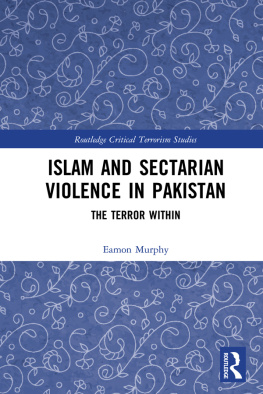
Terror
in the Name
of God
Why Religious Militants Kill
JESSICA STERN

For: Evan and Jeff
Religious terrorism arises from pain and loss and from impatience with a God who is slow to respond to our plight, who doesnt answer. Its converts often long for a simpler time, when right and wrong were clear, when there were heroes and martyrs, when the story was simple, when the neighborhood was small, when we knew one another. When the outside world, with its vulgar cosmopolitanism, didnt humiliate us or threaten our children. When we did not envy these others or even know about them. It is about finding a clear purpose in a confusing world with too many choices. It is about purifying the world. The way forward is clear: kill or be killed. Kill and be rewarded in heaven. Kill and the Messiah will come. It is about seeing the world in black and white. About projecting all ones fears and inadequacies on the Other. Why is my life not going as well as it should? The answer is America. The answer is affirmative action. The answer is the Jews. The answer is the Dome of the Rock. A devilish cabal controls the banking system and the press through globalization and world government, through the Council on Foreign Relations, or the Arab oil sheiks. My people are in the majority. This is the temples wall. The wall where his horse stood tied. It is clear from the Bible that this land is legitimately ours. Archaeologists show. History proves. My ancestors bones. My people are suffering. Without this piece of land or this temple, I am not whole. My people are not whole. We are spiritually dead. We are dry bones cast about the earth. This is where our Messiah will rule. This is where our prophets walked. This is the furthermost place of his nocturnal ride, where miracles happened, where He made us the chosen people, where loaves became fishes, where He comforted the afflicted, where He rose to heaven, where the angel Gabriels handprints remain. This, in short, is where bloodbaths begin.
Any creative encounter with evil requires that we not distance ourselves from it by simply demonizing those who commit evil acts. In order to write about evil, a writer has to try to comprehend it, from the inside out; to understand the perpetrators and not necessarily sympathize with them. But Americans seem to have a very difficult time recognizing that there is a distinction between understanding and sympathizing. Somehow we believe that an attempt to inform ourselves about what leads to evil is an attempt to explain it away. I believe that just the opposite is true, and that when it comes to coping with evil, ignorance is our worst enemy.KATHLEEN NORRIS
I teach a course called Terrorism at Harvard Universitys Kennedy School of Government. I have been studying terrorism for many years in various capacities as a government official, a scholar, and as a university lecturer. A few years ago I decided to do something scholars rarely do: I decided to talk with terrorists.
People have always told me their secrets. Taxi drivers tell me about their dreams, their relationship with their bosses or their siblings, their affairs. A professional acquaintance once declared that he had killed someone in self-defense and had never before told anyone. I will also confess that I am intensely curious, especially about spiritual and emotional matters, and I suppose secret-sharers sense this. This personality quirk has been useful in talking to terrorists, as important, I believe, as my academic training and my experience working in national security agencies.
All of us at various points in our lives experience spiritual longing. I started this project in such a phase. I visited synagogues, churches, and mosques. Not attending services, or anyway not often. I wanted to be in rooms saturated with prayer, to feel prayer rugs under my bare feet, to hear the sound of hymns and chants sung by believers. I longed to be able to say that I know God, that I feel His presence every moment, everywhere, even typing in front of this computer screen. I envy people whose parents trained them to believe, who dont have to battle intellect to make room for faith.
In March of 1998, I had my first extended conversation with a religious terrorist. He is an American who had been released from prison and was living in a Texas trailer park at the time we spoke. I called him in connection with an earlier project on terrorists potential to use weapons of mass destruction. Although I had been studying and working on terrorism for many years by that time, none of what I had read or heard prepared me for that conversation, which was about faith at least as much as it was about violence.
Kerry Noble had been second-in-command of a violent apocalyptic cult active in the 1980s, whose members were convicted of murder, firebombing a synagogue and a church that accepted homosexuals, conspiracy to assassinate federal officials, and other crimes. They had stockpiled cyanide with the aim of poisoning major city water supplies and, like Timothy McVeigh ten years later, plotted to bomb the Oklahoma City Federal Building. Their political goals included racially cleansing the United States; bringing down the U.S. Zionist occupied government and replacing it with a Christian one; destroying multilateral institutions such as the United Nations and the World Bank, the same institutions that Al Qaeda would come to describe as instruments of Western domination; and stopping the creation of a new world order based on humanism and materialism.
During our first conversation, Noble told me he spends a lot of time in meditation and prayer. He is an accomplished student of the Scriptures he knows whole chapters of the Bible by heart. And he feels he has a personal relationship with God. He is still 100 percent certain that there is a God and that God is good, even though at an earlier period in his life he listened to God and ended up living on an armed compound in rural Arkansas, doing things he now feels were wrong. Much to my consternation, I found myself feeling envious of Nobles faith, even as I was horrified by his cults plots and crimes. I wanted to keep talking with him. I wanted to understand how a person so obsessed with good and evil, with such strong faith, could be led so far astray.
I was the Superterrorism Fellow at the Council on Foreign Relations in Washington at the time I began this project. I started pestering a psychologist whose office was near mine in Washington. Steve Kull works as a pollster, but he is interested in spirituality and has sometimes assisted people who have had frightening mystical experiences. This man tells me he has seen Gods hand in visions, I report to Steve. He has heard Gods voice. He has experienced revelations. He has spoken in tongues. But he thought he could persuade the Messiah to return more quickly by killing people. Could it be that he really was having spiritual experiences, but misinterpreted them? Or is he simply mad? After meeting with Noble, Steve told me that in his view Noble was not mentally ill. This is a group phenomenon. Once inside an organization whose goals include killing, ordinary people can commit seemingly demonic acts. Some people are more susceptible to such doubling than others, often in response to trauma. Certain professions, including medicine, psychiatry, military work, and research, encourage doubling, at least to some degree. A surgeon incapable of suppressing his capacity to empathize would have trouble slicing open his patients chest. This book is in part about how terrorist organizations foster extreme doubling, extinguishing the recruits ability to empathize with his victim, encouraging him to create an identity based on opposition to the Other.
Next page
